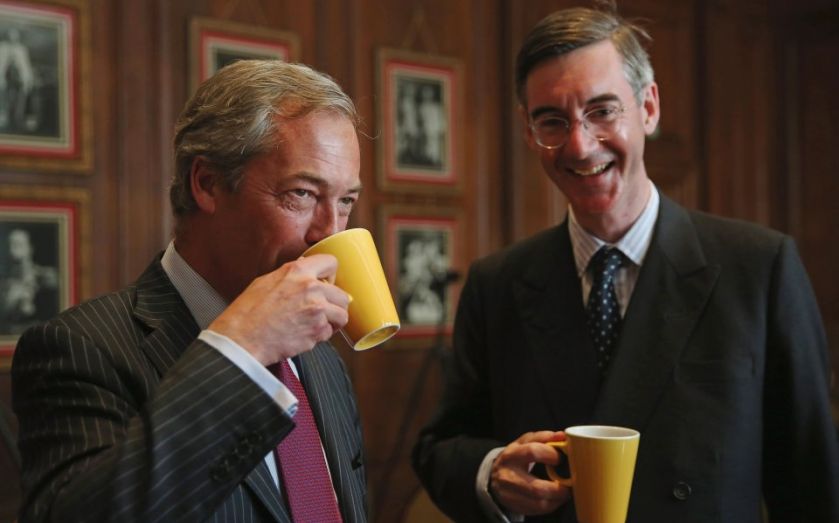Britain needs future-facing leaders, not nostalgic dinosaurs like Rees-Mogg and Corbyn

Jacob Rees-Mogg – committed Brexiteer, potential contender for the Conservative leadership, and devout Roman Catholic – is against abortion and same-sex marriage. Who would have guessed?
Rees-Mogg’s comments on ITV on Wednesday, especially his assertion that a rape victim should be forced to carry an unwanted pregnancy to term, raised eyebrows among the commentariat.
But really, they should not be a revelation. The “Moggster” has always been about as traditionally conservative (with a small c) as they come. A quick look at his record shows he votes according to his religious moral compass. And while his views may be unpalatable to a modern audience, he has every right to hold them, and in fact deserves respect for being honest about them to the public.
Read more: Odds lengthen on Jacob Rees-Mogg becoming next PM
Should he be put forward in a leadership contest, as has been widely hyped over the summer, his fellow MPs and the electorate have the right to know where he stands.
The problem with the prospect of Rees-Mogg as Prime Minister is that he is resoundly – and proudly – old-fashioned: a semi-aristocrat with a Victorian-era attitude, an orthodox view of religion, and a dash of upper-class eccentricity. (He captured the headlines for naming his youngest child Sixtus Dominic Boniface Christopher, after all.)
None of this makes him ineligible for leadership (although had Sadiq Khan espoused in the name of Islam the same views as Rees-Mogg did in the name of Catholicism, his beliefs would have been condemned by some as at odds with liberal, secularist British values). In fact, his tell-it-like-it-is honesty, when other politicians (such as Tim Farron) would have dodged the question, is part of his appeal for those hoping the backbencher will make a bid for the Tory leadership.
Rees-Mogg’s supporters argue that he is a straight-shooting traditionalist with rock-solid credentials, who isn’t afraid to speak his mind and stick to his principles. Who could argue with that?
The trouble is, you could say the exact same thing about Jeremy Corbyn.
Both Corbyn and Rees-Mogg are anomalies, at extreme ends of the political spectrum. Both put their own principled take on the world – be it Marxist socialism or Bible-based conservatism – above the messy collaboration and compromise of modern politicking. And both are resolutely stuck in the past.
Corbyn’s vision of a state-run society and nationalised workforce is straight out of the 1970s. Rees-Mogg’s era of choice appears to fall somewhere in the late nineteenth century. Neither seem to have much awareness that the world in 2017 has moved on from their nostalgic recollections, nor any particular interest in confronting modern problems with twenty-first century solutions.
At some point, we need to ask whether refighting the battles of the past is helpful or productive.
Corbyn’s flagship economic policies in his leadership campaign were renationalising the railways and reopening the coal mines at taxpayers’ expense. Rees-Mogg has used his newfound platform to espouse turning back the clock on social issues that, whether he likes it or not, were settled in public consensus years ago.
Neither appear to have any smart ideas on how to address the problems of today and tomorrow – or if they do, they’re deprioritising them in favour of their own convictions and policies that play well with their adoring fan bases.
How about a radical new approach to the looming social care crisis? A comprehensive programme to address the housing shortage, whether that’s mass land deregulation, or investment in modular-built or 3D-printed houses? An overhaul of the tax and welfare system that incorporates the gig economy and reflects the changing labour market? Some kind of preparation for the advent of AI and automation that is soon to make thousands of jobs redundant? A business-based strategy for energy and climate issues? A plan to tackle intergenerational inequality and the unsustainable nature of the state pension scheme? Nothing in the Bible or Das Kapital is of much use here.
Unfortunately, the new generation of MPs aren’t exactly sparkling with fresh ideas either. Labour’s upcoming “ones to watch” are mostly Corbyn sympathisers – Rebecca Long-Bailey, Clive Lewis, Richard Burgon.
For the Tories, many Cameroons are still tarred by their Remainer affiliations, while the Brexiteers don’t seem to have the energy for anything else. Theresa May’s cabinet looks tired, while the fates of key players like David Davis and Boris Johnson are inextricably bound to the success of the EU deal.
Maybe there is a secret pool of ambitious upstarts with fresh ideas, who are perhaps biding their time and keeping their heads below the parapet until the Brexit drama cools down a bit. If so, they are staying very quiet.
If the best policymakers the two main parties can come up with are Jeremy Corbyn and Jacob Rees-Mogg, the country may not survive contact with the twenty-first century.
Read more: Should we take Jacob Rees-Mogg seriously as a leadership contender?